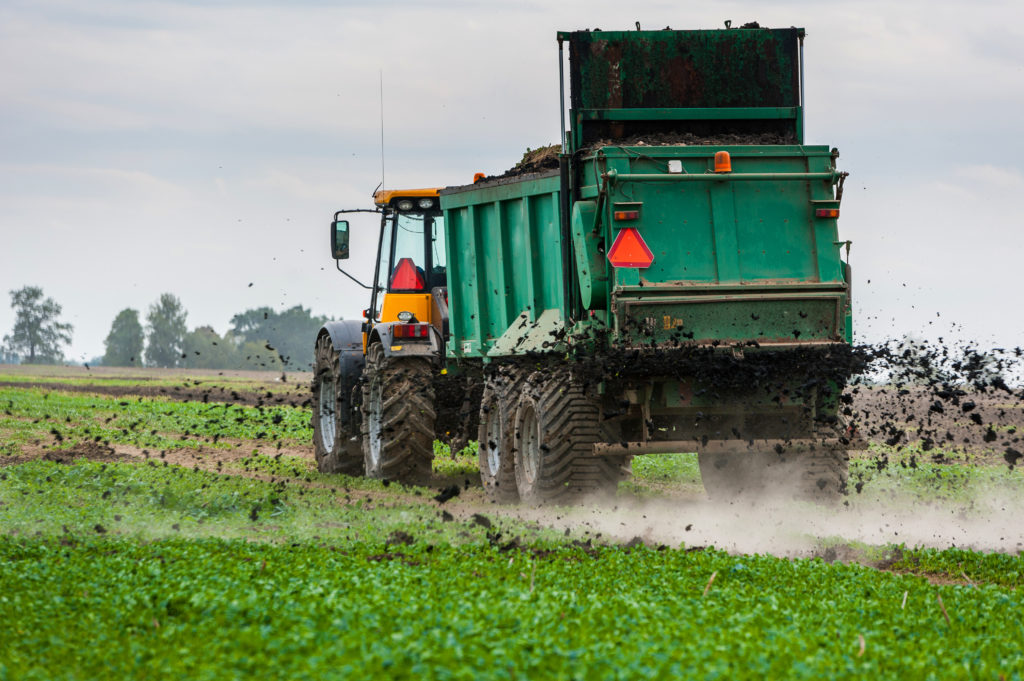


Synthetic or natural? When it comes to our food, it seems like the difference between natural and synthetic fertilizer would be large, but it’s actually smaller than you might think. Although the organic crop production process only uses fertilizer and nutrients sourced 100% naturally, all farmers depend on nutrients found in fertilizers and supplements to keep their soil and crops healthy for a better growing environment.
Synthetic fertilizer is derived from chemicals such as ammonia, natural gas, atmospheric nitrogen, phosphate minerals, and sulfur. A fertilizer manufacturing plant is used to prepare a number of different fertilizer blends. Most blends consist of the major macro nutrients: nitrogen, phosphorus, and potassium; plus, micro-nutrients and secondary nutrients depending on soil analysis and crop demands. Synthetic fertilizers facilitate precision agriculture as they allow crop input suppliers to custom blend fertilizer products that contain nutrient profiles specifically tailored to a fields’ precise nutritional requirements.
Meanwhile, natural organic fertilizer comes from natural sources such as compost, animal manure and crop residues, and is not manufactured in factories. Green manure crops like clover are also used. These naturally add nitrogen to the soil while they’re growing and then add extra organic matter and nutrients when they are plowed back into the soil. The organic matter in natural fertilizer creates a healthy growing environment. However, it’s not always easy to tell how much natural fertilizer to use because even though the nutrients are scientifically measured, they are not routinely checked, so the release rate can vary depending on the climate and application source.
The main difference between synthetic and natural fertilizer is what’s in it. While both contain nutrients needed for plants to grow, natural fertilizer contains smaller amounts of nutrients than synthetics and synthetic fertilizer does not contain the additional organic matter and microorganisms that natural fertilizer does. These components are very important for preventing crop diseases and developing long-term sustainable soil health.
Organic food grown in Canada uses only natural fertilizers. Synthetic fertilizers and supplements are prohibited by the Canadian Organic Standards.
However, conventional farmers may use synthetic or natural fertilizers on their crops, and often choose to use a blend of both types of fertilizer.
Sustainability is an important principle embodied in organic farm production. For this reason, the Canadian Organic Standards recommends the first application of manure comes from the farm itself. That includes manure from any organic and non-organic animals on their farm. After these resources are exhausted, organic farmers may source manure from fully organic animals from other sources.
While synthetic fertilizers have their included nutrients readily available for use by crops, the release of nutrients from organic sources is slower. This means farmers must be more strategic with the timing of their natural fertilizer applications so the plants receive the nutrients at the time they are needed to maximize their potential growth. This can take a bit of planning, which is why organic farmers also rely on other methods like crop rotation and biodiversity to improve the nutritional content of their soils.
Any food with the Canada Organic Logo on it has been grown without the use of synthetic fertilizers. However, it’s not always possible to know whether conventional food was grown with synthetic or natural fertilizers and supplements, or both.
What’s most important is that farmers in Canada, regardless of whether they are growing organically or not, can grow healthy crops in healthy soil using nutrient-rich sources. Both natural and synthetic fertilizers provide high-quality nutrients needed for growth. And because all fertilizers and plant supplements imported into or sold in Canada are regulated by the Canadian Food Inspection Agency under the Fertilizers Act and Fertilizers Regulations, consumers can rest easy knowing the Alberta grown food they buy is safe to eat.
Do you want to learn more about what organically-grown means in Alberta? Would you value monthly updates on Alberta’s local organic sector – including legislation, farming practices, GMO regulation, and more? Now you can receive it the way you want to:
Sources
https://aitc-canada.ca/en-ca/learn-about-agriculture/conventional-or-organic-fertilizer
https://www.organicfederation.ca/canadian-organic-standards#5.4%20soil%20fert
[/vc_column_text][/vc_column][/vc_row]



Disclaimer: Opinions expressed in this document are those of the author and not necessarily those of the Governments of Canada and of Alberta. The Government of Canada, the Alberta Ministry of Agriculture and Forestry, and its directors, agents, employees, or contractors will not be liable for any claims, damages, or losses of any kind whatsoever arising out of the use of, or reliance upon, this information.
![]() More Get the Facts
More Get the Facts
Apr 9 | Get the Facts
This article was written prior to the tragic passing of Cathy Halonen, and is being published in remembrance of her. Her passion and dedication to o
Read MoreMar 30 | Get the Facts
Walking through grocery stores, you’ve seen food with marketing phrases like “all-natural," “sustainably grown," “pasture raised," “hormon
Read MoreJan 14 | Get the Facts
There’s no doubt about it: antibiotics are life-saving medications that play an important role in the lives of humans and animals alike. They’
Read More